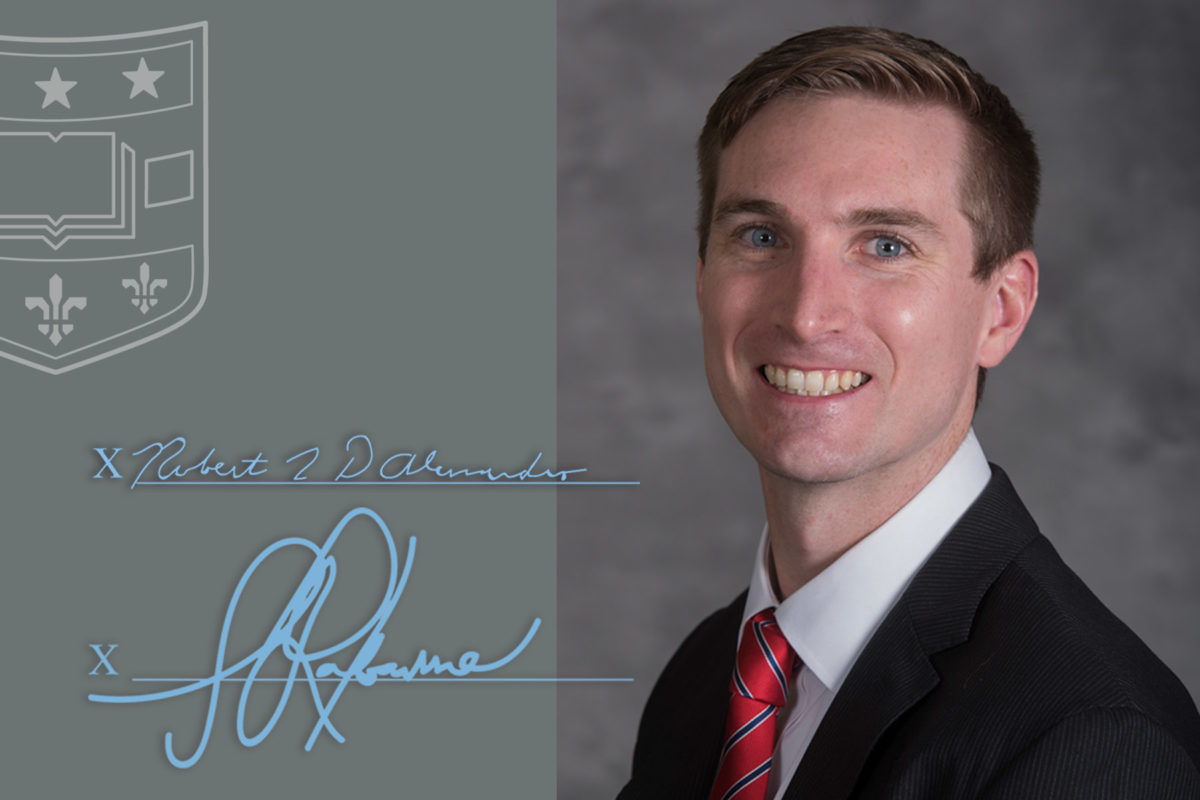Study links CFO narcissism, poor accounting choices
- February 20, 2018
- By Kurt Greenbaum
- 3 minute read

Does a CFO with an outsized signature make more questionable choices while keeping the company books? According to Olin professor Chad Ham, the answer is yes.
Researchers connected the dots between the size of a CFO’s signature, the CFO’s level of narcissism, and the quality of their firm’s financial reporting in a recently published paper in the Journal of Accounting Research.
The authors’ research showed a link between large signatures and higher levels of narcissism. From there, they showed that “narcissistic CFOs are less likely to recognize losses in a timely manner…consistent with a willingness to cover up past mistakes.”
That paper, published in December, was part of a one-two punch Ham and his collaborators delivered linking management results from both CFOs and CEOs with their level of narcissism. A second paper focused on CEOs has been accepted for publication in the Review of Accounting Studies.
Unique approach to measuring personality
“Part of what’s unique about our research is how we’re capturing narcissism,” said Ham, an assistant professor of accounting at Olin. Because, of course, they couldn’t ask top corporate executives to submit to a personality test, signature size became a proxy for their level of self-love.
Ham, along with researchers from the University of North Carolina at Chapel Hill and the University of Maryland, College Park, staged a laboratory experiment to confirm previous research linking signature size and narcissism.
The researchers paired student volunteers and asked them to allocate $5 between themselves and their anonymous partners. Each was given a default allocation of $2.50. The students could stay with the default amount or decide to keep a larger or smaller amount for themselves—knowing that their anonymous partner was given the same task. After that assignment, the students had to fill out a personality test and sign their names.
The results confirmed that the students with larger signatures tended to be more narcissistic and, Ham said, “the more narcissistic participants were more likely to keep a larger share of that $5 endowment for themselves—to misreport their default allocation.”
The researchers then expanded their view with a field experiment reviewing data from more than 500 companies whose CFOs’ notarized signatures could be found on public SEC documents.
“We were able to show a relationship between CFO narcissism and aggressive financial reporting choices,” Ham said. The errors or misreporting took the form of overly aggressive accrual choices; a higher-than-expected level of restatements; and real activities (such as slashing advertising expenses near the end of a year to depress expenses and increase earnings).
Confirming results
Ham and the research team also compared the performance of the companies before and after the CFO was appointed. In the case of the narcissistic CFOs, Ham said, “the firms became more aggressive when these CFOs were appointed.”
The researchers found much the same pattern in the CEO study due for publication in the Review of Accounting Studies. Though not directly responsible for the financial reporting in the company, the paper shows that narcissistic CEOs—those with larger signatures—tended to over-invest in riskier projects and received higher compensation in spite of poorer financial performance.
So, should corporate boards just steer clear of CEOs and CFOs who sign their John Hancock like…well, John Hancock?
Ham says no. It’s not that simple.
The purpose of our work isn’t to advocate for signature size as a measure of narcissism. It’s to study how executive narcissism affects firm behavior.
—Olin professor Chad Ham
A narcissistic CFO might benefit the company in other ways—ways that aren’t measured in this study.
At most, he said, corporate leaders should be aware of their C-suite occupants’ narcissistic tendencies and “you might want to make sure you have appropriate checks and balances in place.”
“If you want to glean anything from signature size,” Ham said, “you need to have a large sample. It’s an ‘on-average’ effect.”
Pictured above: Chad Ham with two sample signatures his research paper referenced from SEC documents, showing the relative different sizes in the signatures.
Media inquiries
For assistance with media inquiries and to find faculty experts, please contact Washington University Marketing & Communications.
Monday–Friday, 8:30 to 5 p.m.
Sara Savat
Senior News Director, Business and Social Sciences
